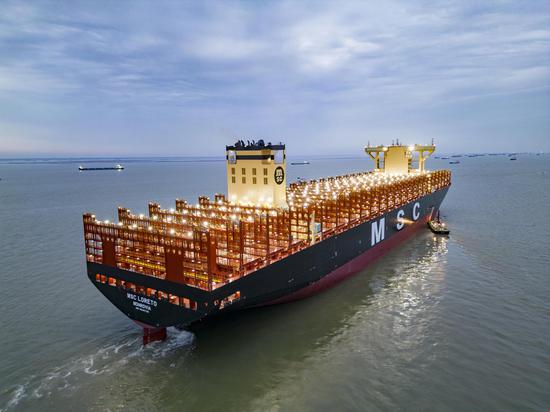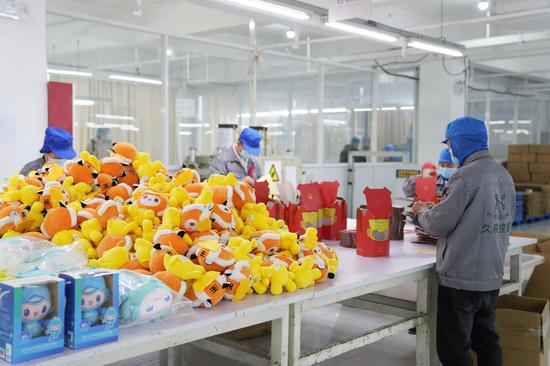Chen emphasized that the company's cross-border e-commerce business will not simply repeat what others have already done, but will instead strive to create its own unique value.
The combined size of imports and exports of the country's cross-border e-commerce segment reached 2.11 trillion yuan in 2022, up 9.8 percent year-on-year, the General Administration of Customs said. E-commerce exports alone reached 1.55 trillion yuan in the same year, up nearly 12 percent.
Zhang Zhouping, a senior analyst of business-to-business and cross-border activities at the Internet Economy Institute, a domestic consultancy, said Chinese e-commerce platforms are accelerating their expansion in overseas markets to seek new sources of revenue given the slowing growth in domestic e-commerce.
Temu, however, still faces intense competition from established players such as Amazon in the U.S. market, Zhang said. "Chinese fast-fashion online retailer Shein and AliExpress, Alibaba Group's cross-border e-commerce platform, both of which have already established a significant presence in overseas markets like the U.S., will also face stiff competition," Zhang added.
Cross-border e-commerce has emerged as a key way to mitigate the impact of the pandemic on foreign trade, Zhang said. It is also playing a crucial part in encouraging traditional foreign trade enterprises to build new brands.
"Price, quality and service are the most important factors consumers consider when buying products. Low prices have shown some obvious advantages, especially amid global economic downward pressures," Zhang said, while underscoring the significance of ensuring the stability of supply chains and compliance with local laws and regulations.
Fashion retailer Shein is expanding its facilities in the U.S., one of the company's key markets, with plans to open two more distribution centers. That could help shorten delivery times to its customers by three to four days, said George Chiao, president of Shein's U.S. operations, according to a report in The Wall Street Journal.
The company opened its first distribution center in Whitestown, Indiana, in April. The additional warehouses will greatly improve delivery efficiency, given that it now takes 10 to 15 days for Shein customers to receive their orders. Shein will also hire hundreds of more employees in the U.S., the report said.
Shein, known for its low prices and a large selection of fashionable clothing and accessories, surpassed Amazon in app downloads on U.S. mobile platforms for the first time in the second quarter of last year, according to Sensor Tower.
Shein announced in November that it had opened a new office and the company's first distribution facility in Canada. "Our new facility will help us cut shipping times for Canadian customers and reduce the number of packages in the international shipping stream," said Vito Zhong, general manager of Shein Canada.
With the opening of the new facility, Shein Canada plans to add approximately 200 new corporate and warehouse jobs by the end of 2023.
Overseas consumers have gradually boosted their awareness of, and trust in, Chinese companies and products, and maintain a favorable attitude toward Chinese brands, according to a white paper released by online media outlets Sina News and Huanqiu.com.
According to U.S.-based research firm eMarketer, worldwide e-commerce sales are expected to reach $7.39 trillion by 2025, with the penetration rate of e-commerce rising to 23.6 percent in the retail sector across the globe.
China is accelerating steps to boost the development of new forms and models of foreign trade. The Ministry of Commerce said it will work with other departments to introduce measures to support logistics enterprises, cross-border e-commerce platforms and vendors in the building of overseas warehouses.
Chen Tao, an analyst with internet consultancy Analysys in Beijing, said the e-commerce penetration rate in North America is high, and local consumers are willing to buy products using online marketplaces.
Chen called for Chinese enterprises to accelerate localization efforts in overseas markets and pay attention to compliance with local laws and regulations to ensure their brands become reputable.
Chinese tech heavyweight Alibaba Group has also launched Miravia, a new e-commerce platform in Spain, to occupy a bigger share of the midrange to high-end market there.
Miravia is operated independently, and products sold on the platform are mainly from Spanish and other European brands in a wide range of categories, including beauty, fashion, personal care, electronics, foods and infant and healthcare products, Alibaba said.
Miravia, AliExpress and Lazada are three independent business segments under Alibaba. Lazada focuses on the e-commerce market in Southeast Asia, while AliExpress concentrates on cross-border online shopping.
"Spain is one of the European markets with the greatest potential in the e-commerce sector. It has a high penetration of internet and mobile technology, which provides huge potential for a mobile-driven platform like Miravia," said Yann Fontaine, CEO of Miravia.
"We hope to cover all the needs of Spanish consumers while offering local and international brands greater tools to sell and engage with their customers," Fontaine said. The platform also offers new users promotions such as first-order discounts and free delivery of goods exceeding 10 euros ($10.92).
"Chinese companies should make full use of cross-border e-commerce platforms to quickly capture the demand in overseas markets, learn more about relevant laws, regulations and quality standards in these countries, and adjust supply chains to make products that meet local requirements," said Cui Lili, director of Shanghai University of Finance and Economics' Institute of E-commerce.


















































 京公网安备 11010202009201号
京公网安备 11010202009201号